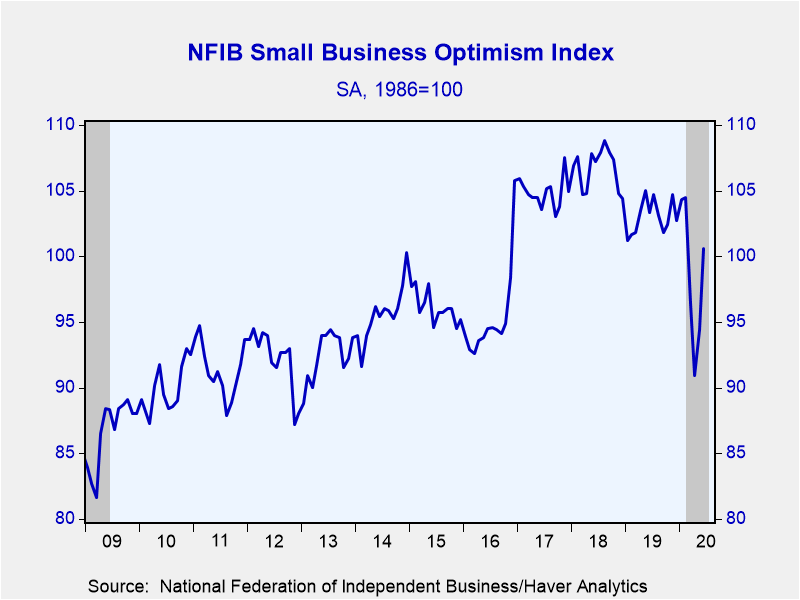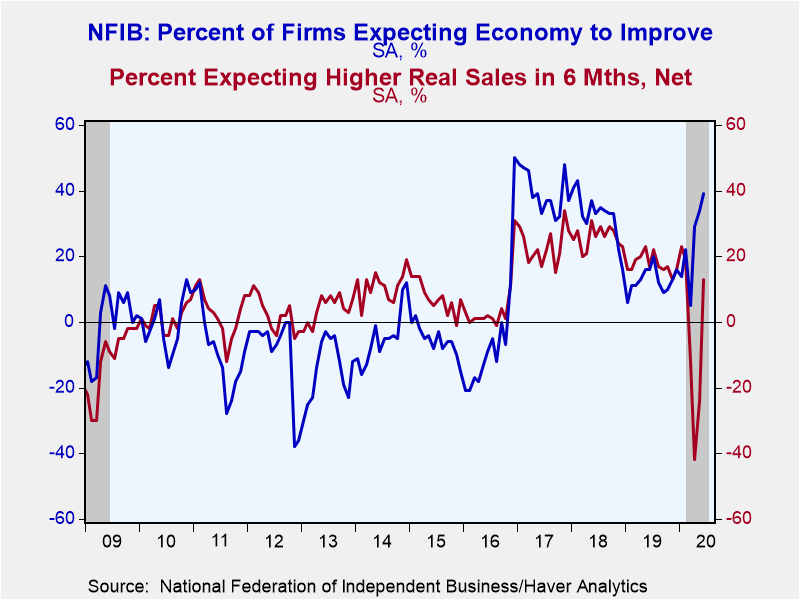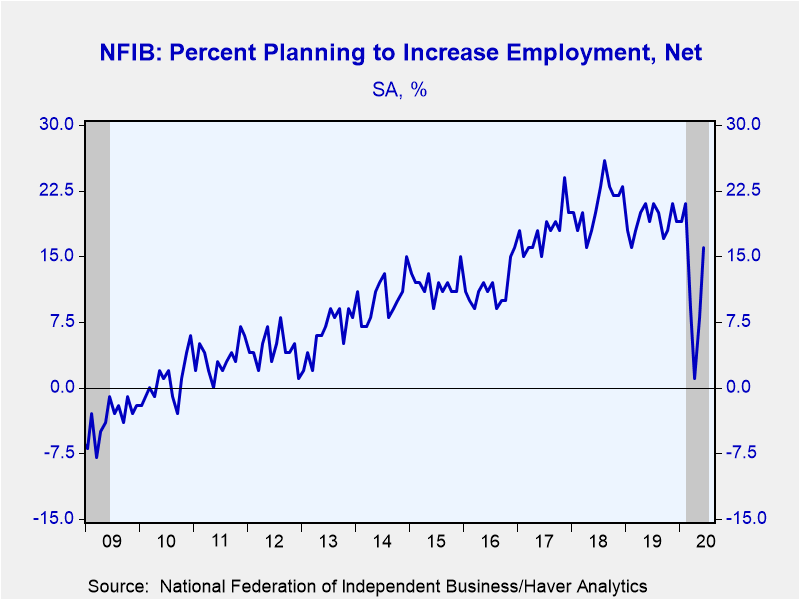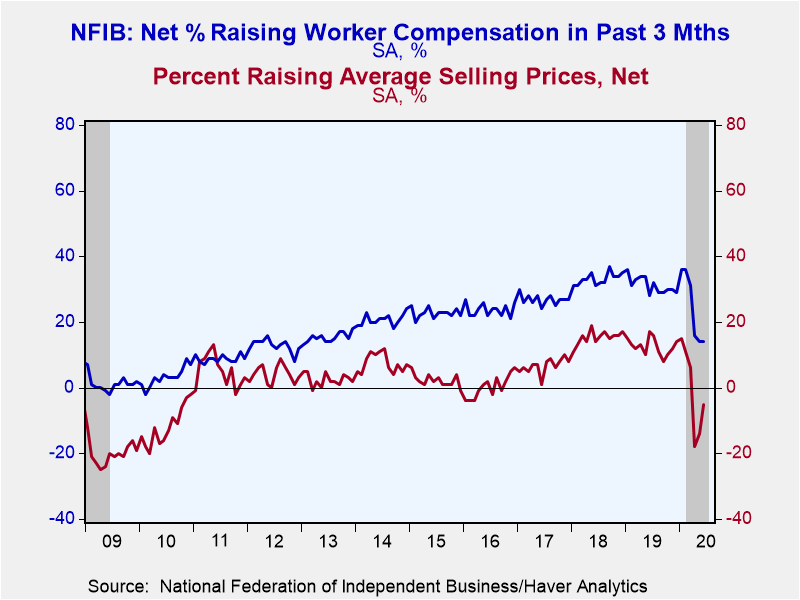 Global| Jul 14 2020
Global| Jul 14 2020U.S. Small Businesses Optimism Rebounds Further in June
by:Sandy Batten
|in:Economy in Brief
Summary
• NFIB Small Business Optimism Index increased 6.2 points to 100.6 in June. • Eight out of ten components rose in June, led by a revival in sales expectations. • Respondents continue to be optimistic about future business conditions [...]
• NFIB Small Business Optimism Index increased 6.2 points to 100.6 in June.
• Eight out of ten components rose in June, led by a revival in sales expectations.
• Respondents continue to be optimistic about future business conditions and expect the recession to be short-lived.
The National Federation of Independent Business (NFIB) Small Business Optimism Index rebounded further in June, rising 6.2 points to 100.6. It rose 9.7 points in May and June, recouping 71% of the 13.6-point decline in March and April.
Eight of the ten components in the index rose in June. Firms continue to expect that the economy will improve with this component rising to a net 39% (the percent expecting economy to improve minus the percent expecting it to weaken), its highest reading since February 2018. The component exhibiting the most significant improvement in June was sales expectations, which jumped up to 13% from -24% in May and -42% in April (a record low) as respondents expect sales to be boosted by the reopening of businesses that has begun. This was the first positive reading on this; measure in four months. However, sales in the second quarter were dismal, as widely expected. The percent balance for Q2 sales plunged to -31 in June from -19 in May and -11 in April, clearly reflecting the adverse impact of the widespread lockdowns employed from late March to mid-May. The June reading was the lowest since the global financial crisis in 2008-09.
Plans to increase employment also rose further in June, to 16% from 8% in May and 1% in April. While there has been a big improvement over the past two months, the June reading is still below the reading of 21% in February. Obviously, the pandemic did nothing to improve the skills of the existing workforce with 43% of respondents indicating they were having difficulty finding applicants with required skills and 19% indicating that this was their top business problem.
The NFIB Uncertainty Index edged down to 81 in June after having risen to 82 in May though it remains elevated by historical standards. Similarly, only a net 22% of respondents in June plan capital outlays in the next few months. While this is up two points from May, this measure remains at levels previously consistent with recession.
Disinflationary pressures remained though are diminishing. A net -5% of respondents are raising prices versus -14% in May and -18 in April and well below the readings mostly in the plus teens that preceded the coronavirus lockdown.
This survey enquires about problems facing small business. The most pressing problems in June were the quality of labor (19%) and taxes (19%).
Roughly 24 million small businesses exist in the U.S. and they create 80% of all new jobs. The typical NFIB member employs 10 people and reports gross sales of about $500,000 a year. The NFIB figures can be found in Haver's SURVEYS database.
| National Federation of Independent Business (SA, Net % of Firms) | Jun | May | Apr | Jun'19 | 2019 | 2018 | 2017 |
|---|---|---|---|---|---|---|---|
| Small Business Optimism Index (1986=100) | 100.6 | 94.4 | 90.9 | 103.3 | 103.0 | 106.7 | 104.9 |
| Firms Expecting Economy to Improve | 39 | 34 | 29 | 16 | 13 | 32 | 39 |
| Firms Expecting Higher Real Sales | 13 | -24 | -42 | 17 | 18 | 26 | 23 |
| Firms Reporting Now Is a Good Time to Expand the Business | 13 | 5 | 3 | 24 | 25 | 30 | 23 |
| Firms Planning to Increase Employment | 16 | 8 | 1 | 19 | 19 | 21 | 18 |
| Firms With Few or No Qualified Applicants for Job Openings (%) | 43 | 37 | 41 | 50 | 52 | 51 | 49 |
| Firms Reporting that Credit Was Harder to Get | 3 | 2 | 4 | 2 | 4 | 4 | 4 |
| Firms Raising Average Selling Prices | -5 | -14 | -18 | 17 | 13 | 15 | 7 |
| Firms Raising Worker Compensation | 14 | 14 | 16 | 28 | 31 | 33 | 27 |
Sandy Batten
AuthorMore in Author Profile »Sandy Batten has more than 30 years of experience analyzing industrial economies and financial markets and a wide range of experience across the financial services sector, government, and academia. Before joining Haver Analytics, Sandy was a Vice President and Senior Economist at Citibank; Senior Credit Market Analyst at CDC Investment Management, Managing Director at Bear Stearns, and Executive Director at JPMorgan. In 2008, Sandy was named the most accurate US forecaster by the National Association for Business Economics. He is a member of the New York Forecasters Club, NABE, and the American Economic Association. Prior to his time in the financial services sector, Sandy was a Research Officer at the Federal Reserve Bank of St. Louis, Senior Staff Economist on the President’s Council of Economic Advisors, Deputy Assistant Secretary for Economic Policy at the US Treasury, and Economist at the International Monetary Fund. Sandy has taught economics at St. Louis University, Denison University, and Muskingun College. He has published numerous peer-reviewed articles in a wide range of academic publications. He has a B.A. in economics from the University of Richmond and a M.A. and Ph.D. in economics from The Ohio State University.
More Economy in Brief
 Global| Feb 05 2026
Global| Feb 05 2026Charts of the Week: Balanced Policy, Resilient Data and AI Narratives
by:Andrew Cates










